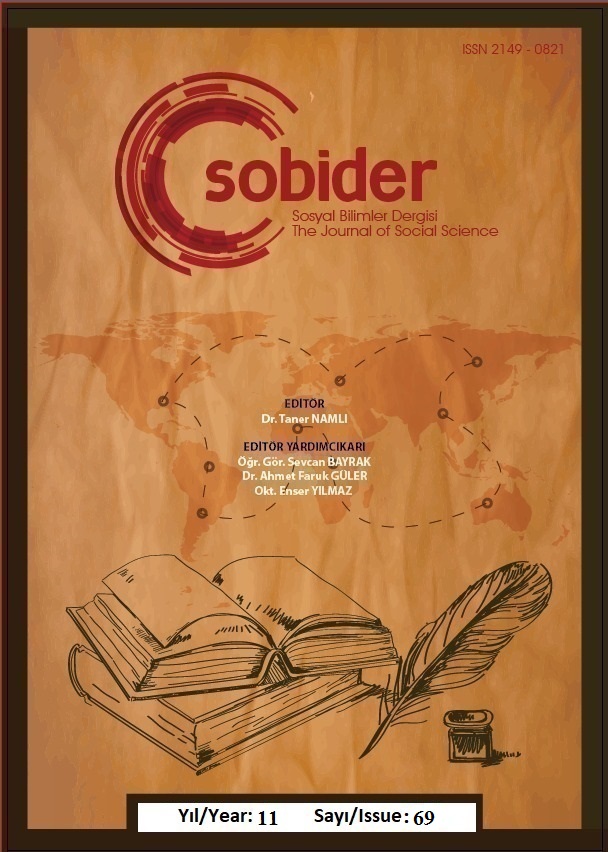15. VE 16. YÜZYILDA OSMANLI DEVLETİ’NİN SAVAŞ ESİRİ ALGISININ ORTAKÇI KULLAR ÜZERİNDEN DEĞERLENDİRİLMESİ
Author :
Abstract
Osmanlı Devleti’nde özellikli sosyal toplulukların zirai üretim ile olan ilişkisi, ortakçı kullar adı verilen grubun Osmanlı sosyo-ekonomik tarihi içerisindeki etkileri ile birlikte değerlendirilebilir. Ortakçı kullar, Osmanlı Devleti’nde savaş ve fetihlerden sonra ele geçirilen savaş esirleridir. Bu çalışmada, savaş esirlerinin Osmanlı Devleti merkezi yönetimi tarafından nasıl algılandığı, sosyo-ekonomik yapı içerisinde kendilerine tanınan imkân ve istihdam koşullarının neler olduğu incelenmeye çalışılmıştır. Çalışma nitel bir araştırma olup Osmanlı kanunnamelerinin ortakçı kulları konu alan has kanunnameleri birincil kaynak olmak üzere, literatür taramasını kapsayan doküman incelemesi yöntemi ile hazırlanmıştır. Ortakçı kullar Osmanlı toplumunda yerleşik olarak yaşayıp, hukuki pozisyon bakımından esirlik ile hür köylülük arasında bir yere konumlandırılmışlardır. Vakıf ve has arazilerinin işletilmesinde, toprak üretiminin devamlılığı ve iskân çalışmalarında kendilerinden yararlanılmıştır. Bu çalışma sonucunda, savaş esirlerinin, ortakçı kullar adı altında, Osmanlı tarım ve toprak sisteminde yeni bir usul oluşturduğu görülmüştür. Ortakçı kulların, savaş esirliği ile başlayan ortakçı anlayışı ile kul statüsünde devam eden pozisyonları, ilerleyen dönemlerde Osmanlı tebasına entegre olmalarını sağlamıştır. Ortakçı kulları konu alan kanunname ve nizamnameler, zamanla bu grubun toplumla bütünleşmesinde etkili olmuştur. Kendilerine sağlanan istihdam koşulları ve imkânlar doğrultusunda, ortakçı kulların bilgi birikimlerinin ekonominin farklı dallarındaki alanlara yansıdığı elde edilen verilerden anlaşılmıştır. Osmanlı Devleti’nin savaş esiri olan ortakçı kullara olan bakış açısının “devlet-i ebed müddet” ekseninde “daire-i adalet” temelli olduğu sonucuna ulaşılmıştır.
Keywords
Abstract
The relationship of specific social groups associated with agricultural production in the Ottoman Empire can be evaluated in conjunction with the effects of the group called sharecroppers in the Ottoman socio-economic history. The sharecroppper subjects are the prisoners of war captured subsequent to the war and conquests in the Ottoman Empire. In this study, it has been attempted to examine how the sharecroppers were perceived by the central government of the Ottoman Empire, what sort of opportunities and employment conditions they possessed within the socio-economic structure, and their contribution to the economy. The study is a qualitative research and it has been prepared based on the document review method covering the literature review, with the Has Code of Laws which are the primary sources, pursuant to the subject of sharecroppers in the Ottoman statute book. Sharecroppers lived in Ottoman society and were positioned in a status between slavery and free peasantry in terms of legal position. They were hired and employed for the management and operation of foundation and private lands, the continuity of land production and settlement works. As a consequence of this study, it has been seen that the prisoners of war, who were placed in hassa (private) farms, created a new method in the Ottoman agriculture and land system under the name of the sharecropper subjects community. It has been determined that the sharecropper subjects continued to live abiding by the subject status that started with the captivity of war and integrated with the Ottoman subjects in the following periods within the context of sharecropper understanding. The codes of law and regulations enacted with regard to the sharecroppers enabled this group to integrate with the society in the course of time. In accordance with the employment conditions and opportunities provided to them, it was understood from the data vi obtained that the fund of knowledge of the sharecroppers was reflected on the domains of different branches of the economy. It has been concluded that the viewpoint of the Ottoman Empire towards the sharecroppers, who are originally prisoners of war, is based on justice in the axis of the eternal state notion.





